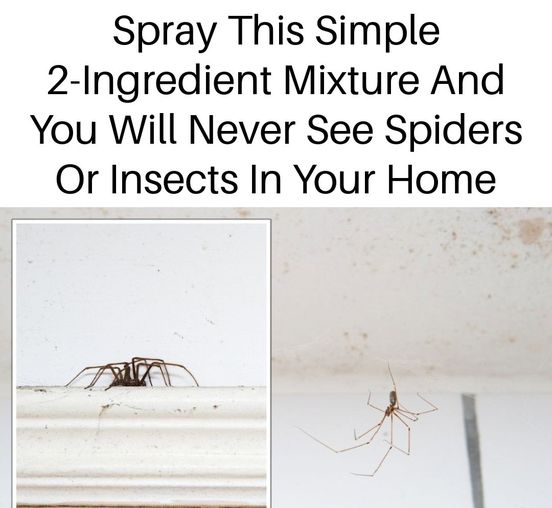Arachnophobia is a common fear that often inspires people to seek methods to eliminate spiders. In a widely debated discussion, people have weighed the use of eco-conscious and natural remedies verse the standard chemical mixtures from hardware stores.
There are two types of people, those who love creepy crawlies and those who will stop at nothing not to encounter them. The people who love creepy crawlies, particularly spiders, know that most pose very little threat and aren’t typically aggressive. However, for those who absolutely hate or fear them, keeping them at bay is the only option for peace of mind.
Spiders Are Essential Too
While some spiders are venomous, they all play an integral role in the ecosystem, keeping other bugs out of our homes and gardens. Furthermore, because spiders can be found hiding out within the walls of homes and buildings, it can be particularly tough to get rid of them, for good.
Because many people have come to learn of the benefits provided by spiders, they’ve turned toward more humane options of “disposal.” One is to capture the spider in a glass jar and take it an empty field nearby. Another option is to set it free in the garden to eat other harmful insects. Sadly, there’s not much scientific evidence that natural remedies work as efficiently as their toxic counterparts. However, many commercial pest-control companies explain that certain essential oils are “natural insecticides” and will likely repel spiders.
One home remedy that is thought to keep spiders away is peppermint oil. This fragrant ingredient can be found in almost any local grocery store. Generally, in the baking section, however, you can also find the pure essential oil in health food stores and places that sell aroma therapy supplies.
The reason it’s thought that spiders will steer clear of this, and other essential oils, is the strong odor. It is believed that because spiders taste and smell using their legs, they avoid having to crawl through odors and fragrances. Another theory is that the monoterpenoids, consider a botanical fumigant, can be found in almost all essential oils. Peppermint oil has also been shown to deter ants and other pesky home invaders.
Spider Repellent Recipe
To make a spider-repellent spray, all you need is two ingredients:
- Five drops of peppermint essential oil
- 16-oz water in a spray bottle
Some sources also suggest adding a quick dash of dish soap. Shake the mixture well, then spray around doors, windows, dark corners, and around the outside perimeter of homes or offices, focusing on corners and entryways like windowsills. Note that you’ll need to spray more often than with other conventional pest control methods.
Peppermint Oil Safety
Peppermint Oil is typically considered safe when used in moderation. Therefore, it’s imperative to always dilute peppermint and other essential oils with water. However, ALWAYS AVOID CONTACT WITH EYES. Furthermore, in large doses menthol, a chemical compound found in mint, can cause skin irritation, dizziness, muscle weakness, nausea, and in some cases double vision or confusion/brain fogginess.
Another thing to consider if you have pets is that using a peppermint oil spider repellent, may be harmful to common household pets. If you plan to give the oils a try, it’s important to keep them in an area in which pets don’t have access.
Other Natural Spider Repellents
Other recommended “natural spider repellents” include:
-
- lemon oil- thought to help brighten skin tone.
- eucalyptus oil- can also help reduce cold symptoms.
- tea tree oil- also thought to be anti-bacterial and can help treat acne prone skin.
- citronella oil- also thought to repel mosquitos.
- lavender oil- thought to have calming and uplifting effects on one’s mood.
To eliminate spiders and other pests from gardens and yards, thereby hopefully keeping them from getting into the home, try spreading cedar mulch around the yard. A cedar ball in the closet might also discourage them from hiding in drawers or inside clothing.
A less humane but still relatively natural option is “sticky glue traps.” These are normally recommended to use for flies but can also catch spiders or other pesky insects.
Traditionally, most pest-control companies or hardware stores had insecticides available as their method of getting rid of spiders and other common household pests. Although they’re more harmful to a garden’s ecosystem, water sources, and even to our lungs and skin, they have been proven incredibly effective in getting rid of spiders and other household pests. Some common options include:
-
- Carbaryl- disrupts the nervous system and eventually kills spiders. It comes in a variety of forms including dust or “wettable” powder, granule, liquid, and traps.
- Pyrethrins and pyrethroids- derived from chrysanthemum flower extract. These also stimulate the nervous system, eventually leading to death. These are available as a bug bomb, fogger, dust, or liquid.
Preventing Spiders Altogether
While getting rid of spiders can be tough, and take some time and patience, there are some preventative steps one can take, to eliminate spiders showing up in the first place.
Step 1. Keep a clean home, with minimal dust. Paying particular attention to windowsills and corners.
Step 2. Ensure no visible cobwebs or spider egg sacks are left around. (Be careful when disposing of the egg sacks, as squishing them can release hundreds of baby spiders)
Step 3. Removing piles of wood, including storing firewood, leaf piles, or compost piles, and storing them on part of the property far away from the house.
Step 4. Ensure that all window screens, doors, and molding has been sealed. This might involve caulking or spackling holes.
While you may strongly desire the DIY options, in cases of extreme spider infestations or venemous spiders, hiring a professional may be your safest option.
